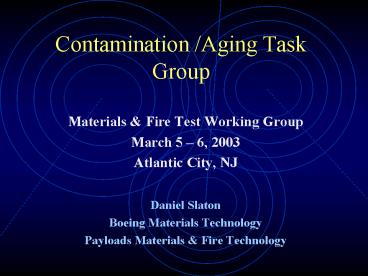Contamination Aging Task Group - PowerPoint PPT Presentation
Title:
Contamination Aging Task Group
Description:
An airline contact name and phone number to coordinate activities for this effort. ... The following tests have been initiated using a PET insulation blanket film: ... – PowerPoint PPT presentation
Number of Views:42
Avg rating:3.0/5.0
Title: Contamination Aging Task Group
1
Contamination /Aging Task Group
- Materials Fire Test Working Group
- March 5 6, 2003
- Atlantic City, NJ
- Daniel Slaton
- Boeing Materials Technology
- Payloads Materials Fire Technology
2
Contamination /Aging Task Group
- Topics
- Communication of New Task Group
- Airline Survey Form Development
- Request for Airline Participation
- Contamination /Aging Literature Search
- General Contamination Lab Results
- Insulation Blanket Film Aging Studies
- Future Activities
3
Contamination /Aging Task Group
Communication of New Task Group To
IndustryFebruary 4, 2003Letter to ATA, IATA,
AEA From Dick Hill
4
Contamination /Aging Task Group
Airline Survey Form Development
5
Contamination /Aging Task Group
Inaccessible / Hidden Areas
6
Contamination /Aging Task Group
Airline Survey Form Development
Format courtesy of Peter Short, BAB
7
Contamination /Aging Task Group
Request for Airline Participation
- The following was requested of
- several domestic airlines
- Onsite visit by Task Group representatives.
- A schedule of upcoming heavy maintenance activity
for all airplane models and locations. - An airline contact name and phone number to
coordinate activities for this effort. - Samples of insulation blankets that been replaced
during standard maintenance.
8
Contamination /Aging Task Group
Contamination /Aging Literature Search
9
Contamination /Aging Task Group
Contamination /Aging Literature Search
- Contamination Search Goals
- General fire testing approaches, procedures, and
test data involving the effect of contamination. - Identify definitions of contamination.
- Determine test methods used to quantify
contamination (dirt, dust, lint) and systematic
ways for applying levels of contamination.
10
Contamination /Aging Task Group
Contamination /Aging Literature Search
- Contamination Search Results
- Identification of industrial test reports from
Combustion and Flame periodical. - Other searches still in progress.
11
Contamination /Aging Task Group
Contamination /Aging Literature Search
- Aging Search Goals
- General search within the Journal of Polymer
Degradation on degradation kinetics. - Summarize test methods used to evaluate changes
in polymer morphology. - Summarize thermal and hydrolytic degradation
methodology for use on polyethylene terephthalate
(PET).
12
Contamination /Aging Task Group
Contamination /Aging Literature Search
- Aging Search Results
- Summarized potential test methods used to
evaluate polymer morphological changes. - Summarized physical aging test approaches on PET.
13
Contamination /Aging Task Group
Contamination /Aging Literature Search
Summary of Testing Methodology to Characterize
Polymer Morphology Degradation (based on PET)
- DSC - determines degradation kinetics (Tg,
endotherms, percent crystallinity) - TGA - degradation temperatures, onset and
average. - TMA - determine CTE (indication of shrinkage
force) - ATR-IR - detect changes in the chemical
fingerprint - Polarized Light Microscopy - thin film
micrographs that differentiate morphology
(crystalline and amorphous phases). - SEM evaluate morphology and sperulite sizes
after etching
14
Contamination /Aging Task Group
General Contamination Test Results
15
Contamination /Aging Task Group
Lab Tests on Contamination
Tests used on in-service insulation blanket
- Laboratory Tests Performed
- Polarized Light Microscopy performed on solids.
- FTIR Analysis performed on solids removed from
the surface and on solvent soluble debris. - Microprobe (elemental analysis)
16
Contamination /Aging Task Group
Lab Results on Contamination
- Microscopy Microprobe Results
- Resinous lumps, amber brown
- Rubber/elastomer fragment
- Metallic shaving
- Inorganic particles (dirt)
- Mineral grains including quartz, calcite/CaCOs,
clay fines - Fiberglass fibers, some with polymer
coating/binder - Cellulose fibers
- Synthetic fibers (cloth type fibers, Dacron,
Nylon) - Paint flakes
- Mammal hair/fur
- Insect parts
- Plant tissue, pollen grains, seeds
17
Contamination /Aging Task Group
Lab Results on Contamination Results
from in-service insulation blankets
- FTIR Examination
- Hydrocarbon waxy materials (similar to industry
CICs) - Hydrocarbon materials (hydraulic fluids similar
to Skydrol) - Silicone based materials (adhesives, sealants)
- Epoxy based materials (adhesives, composites)
18
Contamination /Aging Task Group
Aging Studies onInsulation Blanket Film
19
Contamination /Aging Task Group
Aging Studies on Insulation Blanket Film
The following tests have been initiated using a
PET insulation blanket film
- Isothermal Thermal Aging Isothermal Aging at
120F, 140F, 160F, and 200F. - Humidity Chamber Aging Isothermal Aging at
120F/100RH, 140F/100RH, and 160F/100RH - Thermal Cycle Testing of Sealed Insulation
Blanket Thermal cycling from 65F to 120F for
1200 cycles. Periodic injection of H20 into the
sealed insulation blanket to maintain constant
water in contact with the film.
20
Contamination /Aging Task Group
Proposed Future Activities
21
Contamination /Aging Task Group
Proposed Future Activities
- Finalize Airline Contamination Survey Form,
formalize notification process, and request
airline survey participation. - Survey airlines and summarize common types of
contamination. - Summarize CIC usage and any flammability test
data on CICs. - Develop improved test methods for evaluating CIC
flammability. - Identify and evaluate production application
processes used by OEMs, maintenance manual
procedures, and Airline maintenance processes
that may introduce fly-away contamination.
22
Contamination /Aging Task Group
Proposed Future Activities - continued
- Identify other components/materials (besides
insulation blankets), that have significant area,
quantity, etcthat could be a potential fuel
source in a fire. - Use a rigorous methodology (CAST approach) to
prioritize those component/materials that will
provide the biggest safety benefit. (e.g. FAA
large scale test evaluating heat release showed
little effect by small thermoplastic
components/tray tables) - Request an update of the 9/2002 benefit analysis
report on hidden area fires to more specifically
address contamination. DOT/FAA/AR-02/50, A
Benefit Analysis for Enhanced Protection from
Fires in Hidden Areas on Transport Aircraft, by
RGW Cherry

